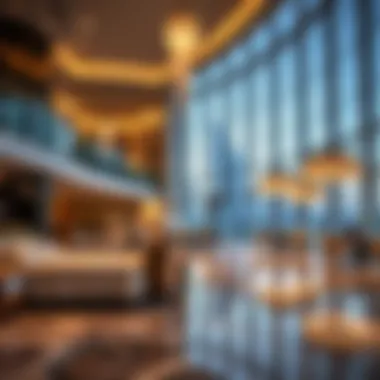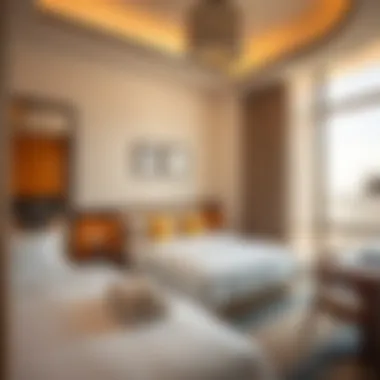Exploring Dubai's Hotels: A Comprehensive Guide


Intro
When it comes to the hospitality scene, Dubai stands tall among its peers, blending opulence and innovation in the most mesmerizing way. Travelers and investors alike find themselves intrigued by the various accommodations the city has to offer—from sky-high luxury resorts to cozy, wallet-friendly hostels.
Exploring the hotel landscape of Dubai is not just about selecting a place to stay; it’s about grasping how these establishments shape the real estate market, reflect visitor preferences, and adapt to ever-evolving trends.
The hotel industry in Dubai isn’t static; it morphs rapidly, compelled by factors such as tourism fluctuations, economic shifts, and even cultural changes. Understanding these elements can give you crucial insights, whether you're a potential traveler seeking the ideal getaway or an investor evaluating prospective options in this vibrant market.
Investors will find that a keen eye on these trends can lead to lucrative opportunities, especially as the city gears up for future mega-events like EXPO 2020, which further amplifies demand for accommodations.
In this guide, we will delve into key aspects of Dubai's hotel scene, offering a diverse perspective on luxurious and budget options, and the swirling currents of the real estate market. From identifying current trends to dissecting investment strategies, each segment is crafted to equip you with the knowledge needed to navigate this dynamic hospitality realm.
Overview of Dubai's Hospitality Sector
Dubai's hospitality sector stands as a cornerstone of its economy, reflecting the city's ambition and growth. It draws millions of visitors from around the globe, offering a plethora of options that cater to every taste and budget. This article seeks to illuminate the various aspects that define this unique landscape, emphasizing the evolution, current trends, and economic contributions of tourism.
Historical Context
The roots of Dubai's hospitality industry can be traced back to the early days of its trade routes. Initially, the city was a modest fishing and trading hub, but as oil was discovered in the 20th century, everything changed. With government efforts to diversify the economy, tourism became a priority. Initiatives started appearing, like the opening of the first international hotel in 1975, the Hilton Dubai Creek. This marked the beginning of a transformation fueled by visionaries who aimed at turning Dubai into a global tourism nexus.
Over the decades, the city has successfully transmuted itself from a quiet corner of the Arabian Peninsula into a spectacle of modernity. Today, its skyline boasts architectural marvels, from the iconic Burj Khalifa to opulent hotels such as the Burj Al Arab. This evolution is not just about luxury; it speaks volumes about how Dubai has placed itself on the world map. The hospitality sector has not only advanced its offerings but also diversified the cultural experiences that will greet travelers.
Current Trends
As of now, Dubai's hospitality sector is riding the waves of innovation, driven by technological advancements and changing consumer preferences. One prominent trend is the rise of experiential travel. Visitors no longer seek merely a place to rest their heads; instead, they crave memorable experiences that resonate on a personal level. Luxurious resorts offer exclusive wellness retreats, while cultural hotels introduce guests to local art and cuisine.
Another significant trend is sustainability. More hotels are turning to environmentally-friendly practices, whether it involves reducing plastic use or implementing energy-efficient systems. The push towards sustainability isn’t just a fad but a growing necessity influenced by global environmental concerns. For instance, the Atlantis, The Palm has initiated conservation programs, including efforts to protect marine life.
Economic Impact of Tourism
Tourism acts as a vital engine for Dubai’s economy. Not only does it create thousands of jobs, but it also significantly contributes to the GDP. In 2019, before the pandemic disrupted global travel, the tourism sector accounted for approximately 11% of the emirate's GDP. After the downturn caused by COVID-19, Dubai has demonstrated remarkable resilience, implementing strategic plans to revive the industry.
"Tourism plays a pivotal role in Dubai’s economy, illustrating the city's ability to adapt and innovate even in challenging times."
The economic implications of tourism extend beyond hotels; they ripple through retail, transportation, and food services. Local businesses thrive when visitors arrive, and special events, such as the Dubai Shopping Festival, attract vast crowds, bolstering overall economic activity. As the world slowly returns to travel and tourism, Dubai aims to rebound stronger and more diversified than before, ensuring a promising future for its hospitality sector.
This overview underscores the criticality of understanding Dubai's hospitality landscape — not just for travelers but also for potential investors and stakeholders looking to engage within this dynamic sector. The interplay of history, current trends, and economic impacts forms the backbone for what this city offers and what lies ahead.
Categories of Hotels in Dubai
Dubai's hospitality sector is a vast tapestry woven with various types of accommodations, catering to a wide range of visitor preferences and budgets. This section explores the Categories of Hotels in Dubai, underscoring how these diverse options not only enhance the travel experience but also play a pivotal role in the city’s flourishing economy. Understanding these categories can empower investors, homebuyers, and travelers alike to make informed decisions, aligning their choices with needs and aspirations.
Luxury Hotels
When one thinks of luxury in Dubai, grandiosity often comes to mind. Luxury hotels are synonymous with opulence and world-class service. Establishments like the Burj Al Arab stand testament to this notion, frequently dubbed ‘the world’s only seven-star hotel.’ These hotels offer a plethora of services — from private butlers to helipads — and cater to those looking to indulge in a lavish experience.
However, what truly distinguishes luxury hotels in Dubai is how they amalgamate culture and modernity. For instance, many luxury hotels incorporate local artistry into their design, providing a unique ambiance that reflects Dubai's rich heritage. Travelers seeking memorable experiences may often find themselves in places that offer exclusive spa treatments, high-end dining options, and panoramic views of iconic landmarks such as the Dubai Fountain or the Palm Jumeirah.
Mid-Range Options
Mid-range hotels offer a superb balance between affordability and comfort. Many visitors opt for these establishments because they provide quality amenities without breaking the bank. Chains like Novotel and Holiday Inn have made a name for themselves by delivering consistency and reliability in service.
What makes mid-range options stand out is their strategic locations throughout the city, ensuring guests are never too far from the action. Families and solo travelers often flock to these hotels for their versatile offerings, including spacious rooms essential for longer stays. With decent dining options and access to transportation, mid-range hotels often become a home away from home.
Budget Accommodations
Not everyone who visits Dubai is looking to splurge. Budget accommodations open the door for frugal travelers eager to explore this vibrant city without exorbitant lodging costs. Places like Ibis and various hostels scattered around downtown cater to a younger crowd or those on tight budgets.
These accommodations, while lacking the luxurious frills of their upscale counterparts, still provide a clean and comfortable place to rest. Many budget hotels also integrate social spaces, allowing guests to engage and share experiences with fellow travelers. This fosters a unique sense of community amidst the cosmopolitan backdrop of Dubai, appealing to backpackers and young adventurers alike.
Boutique Hotels


Boutique hotels offer a refreshing escape from the cookie-cutter designs of larger chains. In Dubai, these establishments are often characterized by their unique themes, personalized services, and intimate settings. Hotels like the Zabeel House boast distinctive concepts that reflect the local culture and art scene.
Aside from their charm, the allure of boutique hotels lies in their ability to curate experiences that cater to individual tastes. Often tucked away in quirky neighborhoods or near trending spots, they provide easy access to unique dining options, local shops, and cultural hot spots. They’re perfect for those who prefer a more personalized experience, where each stay feels as though it is molded specifically for them.
Serviced Apartments
Serviced apartments stand in a category of their own, catering especially to long-term visitors, expatriates, and families. Establishments like The Address Residence come with fully equipped kitchens, laundry facilities, and often more space than a traditional hotel room offers. This makes them an attractive option for visitors who desire the comfort of home while enjoying hotel-like services.
The advantages of serviced apartments are multifaceted. Apart from the flexibility they provide in terms of meal preparation and living space, these accommodations often come with amenities such as pools, gyms, and in-house dining. They give a taste of local life, as visitors are more inclined to immerse themselves within their neighbourhood, visiting local markets and dining spots.
As Dubai’s hotel landscape continues to expand and evolve, understanding these categories helps decipher the best fit for a traveler’s needs or an investor’s portfolio. By grasping the distinct characteristics and offerings within each category, stakeholders can craft strategies that resonate with both individual preferences and broader market trends.
Key Attractions Near Hotels
Exploring Dubai's vibrant hotel landscape is just the beginning of the adventure. The proximity of attractions near hotels often dictates which establishments travelers choose. Visitors typically seek out hotels that not only provide a comfortable stay but also position them within arm's reach of the city's must-see spots, reflecting convenience and lifestyle. Moreover, this close access can enhance the overall travel experience, making every trip more memorable.
Cultural Landmarks
Dubai's rich tapestry of cultural landmarks serves as a serious draw for travelers. The city hosts an array of significant sites that reflect its diverse heritage.
- The Dubai Museum: Nestled within the Al Fahidi Fort, this museum showcases local history and culture, offering visitors a glimpse into the Emirate's past before the skyscrapers took over. This is a great starting point for tourists looking to understand Dubai's evolution.
- Jumeirah Mosque: One of the few mosques in the UAE open to non-Muslims, Jumeirah Mosque is stunningly beautiful. Guided tours provide insights into Islamic practices and architecture, promoting a deeper understanding of local culture.
- Dubai Opera: This cultural gem offers a mix of operas, concerts, and other performing arts, all housed in a striking structure resembling a traditional dhow. Its location near luxury hotels along the waterfront means guests can easily transition from a night of relaxation to a captivating cultural experience.
These landmarks not only provide flairs of authenticity but also make the surrounding accommodations more appealing to those with a taste for culture.
Shopping Destinations
Dubai is renowned for its shopping experiences, blending global brands with local crafts. Hotels located near shopping destinations significantly enrich the visitor experience.
- The Dubai Mall: As one of the largest shopping malls in the world, it offers everything from high-end retailers to a dazzling indoor aquarium. Staying nearby allows for easy access to shopping sprees and entertainment.
- Souk Madinat Jumeirah: This modern take on traditional Arabian market settings merges shops with delightful dining options, all along stunning waterways. Its charm lies in its architecture and the authentic feel, plus it’s just a stone’s throw from luxury hotels, making it a favorite among tourists.
- Gold and Spice Souks: For those wanting to snag local treasures at bargain prices, these traditional souks offer an adventure in themselves with vibrant spices and intricate gold jewelry. Just a short taxi ride from many hotels, these souks are an unmissable experience.
Dining Experiences
Food in Dubai reflects its melting pot nature, offering a plethora of culinary delights, from street food to Michelin-starred restaurants. Being near the action matters, especially when it comes to dining.
- Dubai's Culinary Scene: Hotels nearby the bustling districts are often at a strategic advantage, providing guests with access to some of the best dining experiences. From local Emirati favorites to upscale international cuisine, there’s something for every palate.
- Dining at the Burj Khalifa: Guests in hotels nearby can enjoy dining at At.mosphere, located on the 122nd floor of the Burj Khalifa, boasting mesmerizing views and world-class service.
- Street Food Tours: Adventurous foodies can also delve into Dubai's vibrant street food scene. Cheap local bites are a hit, and the best part is they can often be found just a walk away from many accommodations, minimizing travel time.
Entertainment Venues
When the day winds down, Dubai offers an array of entertainment options for vacationers. Proximity to these venues often enhances guest satisfaction with their hotel choice.
- The Dubai Fountain: Captivating performances delivering stunning light, water, and music spectacles, located near several luxury hotels, provides guests with memorable evenings.
- Global Village: This seasonal attraction showcases cultures from around the world. A hotel stay nearby means guests can easily indulge in this carnival atmosphere, filled with shopping and performances.
- Theme Parks: For families, places like IMG Worlds of Adventure and Dubai Parks and Resorts are nearby and provide thrilling experiences, rounding off a stay with excitement and adventure.
"Accessibility to attractions can define a visitor's experience and affect hotel popularity, emphasizing the importance of location in choosing accommodations in Dubai."
In summary, the architectural wonders and cultural landmarks, chic shopping spaces, and mouth-watering dining options, all nestled close to various hotels, clearly amplify the appeal of staying in Dubai. This symbiosis between attractions and accommodations creates a vibrant visitor experience that is hard to match.
Hotel Market Dynamics
The Dubai hotel market dynamics illustrates a vibrant and complex interplay between various forces shaping the hospitality landscape. As one of the world’s prime tourist destinations, understanding its market dynamics becomes paramount for investors, realtors, and analysts seeking to leverage the opportunities this market presents.
Market Analysis
Analyzing the hotel market in Dubai reveals substantial growth over the years. Reports indicate that the average hotel occupancy rate has consistently hovered around 75% in recent years, a figure that demonstrates strong demand from both leisure and business travelers. It is critical to note that while the luxury segment thrives, there has been a discerning shift towards mid-range and budget accommodations. This demand has sprouted from changing consumer preferences, particularly among millennials and a rising segment of domestic tourists looking for quality without breaking the bank.
Key metrics that can help gauge market stability include:
- Occupancy rates: Vital indicators of market health. Higher rates often lead to increased revenue for hoteliers.
- Average daily rates (ADR): These prices indicate market positioning and brand strategy.
- Revenue per available room (RevPAR): A crucial metric for assessing overall hotel performance.
In addition to this, as hotel brands increasingly adopt sustainable practices, more travelers lean towards eco-friendly options when choosing accommodations. This trend signals a shift in how hotels can position themselves within a competitive landscape, often catering to guests who prioritize sustainability.
Demand Drivers
The factors influencing demand for hotel accommodations in Dubai are multifaceted. Among them are:


- Tourism Growth: Government initiatives like Dubai Tourism Vision 2020 aim to attract 20 million visitors annually, fueling demand for various hospitality offerings.
- Business Travel: As a hub for international business, Dubai sees a steady influx of corporate travelers, adding stability to demand.
- Local Events: Major events, festivals, and exhibitions, such as GITEX Technology Week or Dubai Shopping Festival, act as significant demand drivers, often leading hotels to ramp up marketing efforts during these periods.
- Infrastructure Development: The expansion of transport networks and new attractions enhances accessibility and attractiveness, which further boosts hotel occupancy rates.
Competition Landscape
With a plethora of hotel options available, competition in Dubai's hospitality sector is fierce. Establishments range from high-end resorts to budget-friendly inns, each vying for their market segment. Notably:
- Luxury Chains serve as the cornerstone of Dubai’s hospitality landscape, with brands like Burj Al Arab and The Ritz-Carlton pioneering the luxury experience.
- Mid-Scale Brands see an increasing presence as international brands like Holiday Inn and Novotel expand their offerings to cater to budget-conscious travelers.
- Boutique and Independent Hotels carve out market share by providing customized and unique experiences, appealing to an audience seeking authenticity.
Understanding the competition in Dubai’s hotel market is crucial for existing operators and those eyeing entry into the sector. It demands a nuanced strategy to differentiate one’s offerings and capture the attention of discerning guests.
The landscape also witnesses the rise of alternative accommodation, such as serviced apartments and Airbnb rentals. These options provide flexibility and often appeal to families or extended-stay travelers. As such, traditional hotels must rethink their strategies to stay competitive.
Investing in Dubai's Hotel Sector
Investing in Dubai's hotel sector offers a landscape filled with potential and opportunities worthy of a closer look. The significance of this topic within the broader context of Dubai's hospitality market cannot be overstated. As a rapidly growing tourism hub, Dubai sees millions of visitors each year, providing a steady demand for accommodation. This demand translates directly into lucrative prospects for investors, from seasoned players to newcomers who are eager to tap into the city’s dynamic real estate market.
Investment Opportunities
Dubai's hotel sector boasts a range of investment opportunities, appealing to various investor profiles. Here are several notable options:
- Luxury Hotels: Establishments like the Burj Al Arab and Armani Hotel offer high returns, mainly due to the premium rates they command. Luxury tourism is on the rise, which can lead to higher occupancy and profitability.
- Boutique Hotels: This market segment is growing, where unique design and personalized experiences attract niche travelers. Investors can capitalize on creating hotels that stand out in a crowded market.
- Serviced Apartments: With an increase in long-term tourism and business travel, serviced apartments are gaining traction. These accommodations provide both comfort and convenience, appealing to families and corporate clients alike.
- Eco-Friendly Ventures: The push for sustainability presents a unique angle for investment. Developing eco-friendly hotels can attract environmentally conscious travelers while benefiting from governmental incentives for sustainable development.
Investors should also keep an eye on upcoming events, like Expo 2023, which are likely to surge demand for accommodation, making this an opportune time to invest.
Risks and Challenges
Despite the golden opportunities, diving into this sector isn't without its pitfalls. It's essential to navigate the choppy waters with care:
- Market Volatility: Economic shifts can impact tourism. Fluctuations in oil prices and regional stability can ripple through the tourism sector, affecting occupancy rates and returns.
- High Competition: The influx of new hotels can create a competitive environment. Differentiating offerings becomes paramount to capture a stable share of the market, which can be challenging.
- Regulatory Hurdles: Navigating the local regulations surrounding hotel operation and property ownership can be daunting. Investors must stay updated on policies and requirements, which can be time-consuming and complex.
Future Outlook
Looking ahead, the future of Dubai’s hotel sector appears promising, fueled by continuous growth in tourism and a proactive government stance. Changes in travel patterns, including an emphasis on digital experiences and heightened health safety during the recent pandemic, are reshaping the market landscape. The forthcoming decade promises:
- Technological Integration: Smart technologies and automation are anticipated to enhance guest experiences, leading to increased satisfaction and loyalty.
- Sustainable Development: As global awareness of environmental issues continues, investments in sustainability and eco-friendly projects are likely to grow. Not only does this strategy meet consumer demand, but it also aligns with global trends.
- Diverse Market Segmentation: Rising interest in various types of travelers will lead to diversification in offerings—think family-friendly resorts versus luxury boutique experiences.
Sustainability in Hospitality
The importance of sustainability in the hospitality sector has surged in recent years, especially in a vibrant city like Dubai, where tourism plays a critical role in the local economy. The hospitality businesses in Dubai are increasingly recognizing their responsibility to contribute to environmentally friendly practices, not only to attract eco-conscious travellers but also to reduce their ecological footprints. With the UAE's ambitious vision to promote sustainable development, hotels are expected to align themselves with these goals, harboring substantial benefits for both their operations and the community at large.
With environmental issues creeping up on us quickly, hotels that commit to sustainability are often perceived more positively by guests. This creates a ripple effect that extends beyond just immediate customer satisfaction—reinforcing the brand’s reputation and helping it stand out in an intensely competitive market. Furthermore, sustainability measures can lead to significant cost savings on operations, particularly relating to energy and water usage. As costs keep pushing upwards, adopting green initiatives—notably energy-efficient appliances and water-saving technologies—has become not just a moral choice but a sound business strategy.
Eco-Friendly Practices
Eco-friendliness is all the rage, and hotel chains have begun implementing a variety of eco-friendly practices. For instance, many establishments are switching to LED lighting and energy-efficient appliances, minimizing electricity consumption. Moreover, hotels are investing in solar panels to harness renewable energy, a move that's increasingly popular in sun-soaked Dubai. Additionally, the use of biodegradable cleaning supplies is becoming common, aiming to reduce harmful chemicals in the environment.
Water conservation is also critical; hotels introduce systems for recycling grey water, enabling them to use it for irrigation. Some hotels even offer guests incentives to reuse towels and linens to cut down on laundry frequency. The impact of such small choices shouldn’t be undervalued—they accumulate to make a significant difference over time.
Moreover, sourcing food locally is another burgeoning trend. Restaurants within hotels are finding that partnering with local farms or markets not only supports the local economy but also provides fresher, healthier menu options. This ties into a broader desire among consumers to know where their food comes from, adding an extra layer of charm to the culinary experience.
Consumer Preferences
In the contemporary hospitality arena, consumer preferences are shifting toward sustainability. Today’s travellers, especially millennials and Gen Z, are more likely to choose a hotel that practices environmental stewardship. Their decisions are driven by a mix of personal values and social pressures, as they seek brands that reflect their priorities. Many savvy consumers actively research hotels’ green initiatives before booking, often scanning for certifications like LEED (Leadership in Energy and Environmental Design) or Green Key.
A survey might reveal that a significant percentage of patrons prioritize eco-friendly options and are willing to pay more for sustainable practices. This has created a unique market positioning opportunity for developers and investors, indicating that investing in sustainability isn't just a ethical choice but also a market-driven one.
In this context, hotels can thrive by promoting their green practices heavily in marketing materials. Social media provides a potent platform for showcasing sustainability efforts, and hotels that engage their guests with stories around their eco-initiatives tend to build stronger community connections.
"The hospitality industry is at a crossroads - adapt to sustainable practices or risk being left behind in the dust of irrelevance due to changing consumer demands."
As the conversation on climate change continues to deepen, consumers will increasingly signal that they desire responsible practices. By aligning business models with these changing preferences, hotels can cultivate loyalty, thereby securing a foothold in a market that increasingly values sustainability.


Technological Innovations
The rapid advancement of technology plays a pivotal role in shaping the hospitality landscape in Dubai. As the city continues to attract millions of travelers each year, the adoption of innovative solutions becomes crucial not only for enhancing guest experiences but also for streamlining operations within hotels. Technology can be seen as the backbone of Dubai’s hotel sector, pushing the boundaries of service offerings and redefining expectations in the hospitality industry.
Impact of Digital Transformation
Digital transformation is more than just a buzzword; it’s a necessity in today’s fast-paced hotel environment. For instance, many hotel chains in Dubai are increasingly relying on cloud-based systems to manage bookings and customer relationships, boosting operational efficiency. This shift makes gathering data on guest preferences easier and quicker, allowing hotels to tailor their services accordingly.
"In today’s hospitality industry, no hotel can afford to lag behind in technology or face the risk of losing guests to competitors who are quicker on the uptake."
Moreover, mobile applications are transforming how guests interact with their accommodations. For example, hotels like the Jumeirah Group offer apps that allow guests to control room settings, book amenities, and request services—all from the convenience of their smartphones. Integrating these digital tools facilitates a seamless experience that keeps guests coming back.
Enhancements in Guest Experience
When it comes to enhancing guest experiences, technology is pulling out all the stops. Smart room technology is revolutionizing how guests experience their stay. Imagine walking into a hotel room where the lights adjust automatically, and the temperature is set to your liking, all thanks to an integrated system that remembers your preferences from past visits.
Furthermore, artificial intelligence is being leveraged to provide personalized recommendations through chatbots and virtual assistants. Guests can easily inquire about local attractions or dining options via a simple text conversation, making their stay not just comfortable but also convenient.
Additionally, virtual reality is starting to make its mark in hotel marketing. Some hotels invite potential guests to take virtual tours of their rooms and facilities, offering a taste of the experience before they even show up. This not only captures interest but also influences decisions, with immersive experiences often leading to higher booking rates.
In summary, technological innovations are not merely a trend within Dubai's hospitality sector; they are essential for keeping pace with ever-changing consumer demands. As hotels adopt these advancements, they significantly enhance guest satisfaction, operational effectiveness, and ultimately, profitability.
Regulatory Framework
The regulatory framework surrounding the hotel industry in Dubai plays a critical role in shaping the landscape of its hospitality sector. Understanding these regulations is essential not just for those operating within the sector, but also for investors and stakeholders. The framework sets the standards for quality, safety, and operational efficiency, significantly impacting guest experiences and business profitability.
Policies Affecting the Hotel Industry
Dubai’s government has implemented a variety of policies to guide hotel operations. These policies are designed to enhance competitiveness while ensuring sustainable growth within the industry. Here are some key points worth noting:
- Operational Standards: The Department of Tourism and Commerce Marketing (DTCM) establishes criteria for services provided, ensuring that establishments offer high levels of customer satisfaction.
- Health and Safety Regulations: Hotels must adhere to health and safety policies aimed at protecting both guests and staff. This includes sanitation requirements and fire safety measures.
- Environmental Policies: Encouraging eco-friendly practices, such as waste management and water conservation, has become a high priority. Hotels are often required to develop and implement sustainability programs.
"A well-regulated hotel industry not only protects consumers but also boosts the country’s reputation as a tourist destination."
Investors should recognize that policies can evolve, impacting operational feasibility and attractiveness. Staying up-to-date with these regulations is financially prudent.
Licensing Requirements
In Dubai, obtaining the right licenses to operate a hotel is a complex but necessary process for anyone wishing to enter the hospitality market. Here’s a breakdown of what’s required:
- Commercial License: This is mandatory for all types of hotels, which includes a hotel trade license obtained from the DTCM. It verifies that the business is legitimate and meets local standards.
- Building Safety Certificate: Before a hotel can be operational, it must pass inspections to ensure it adheres to safety codes.
- Health and Safety Permits: Specific permits related to health, safety, and food service are required. These ensure compliance with public health standards and regulations.
- Tourism License: A specialized tourism license from the DTCM allows hotels to operate within the tourist sector, which is essential for attracting international guests.
Understanding these licensing protocols and maintaining compliance is essential for the successful establishment and operation of a hotel in Dubai. Failure to adhere to these requirements can result in penalties, impacting profitability and brand reputation.
Resources for more information include:
- Department of Tourism and Commerce Marketing - Dubai
- Dubai Economic Department - Licensing
- Wikipedia - Tourism in Dubai
As the regulatory landscape continues to shift, keeping a pulse on these requirements will ensure that stakeholders can navigate the complexities of Dubai's booming hotel market.
Finale
The discussion surrounding hotels in Dubai is not just about luxury or space; it encapsulates the evolution of a city that has become synonymous with opulent stays and varied experiences. This section underscores the significance of understanding the hospitality landscape, emphasizing that knowledge of the local hotel sector is essential for investors and travelers alike.
Summary of Key Insights
As we have journeyed through Dubai's hospitality sector, several key insights emerge:
- Diversity in Offerings: The city boasts a wide range of hotel categories from luxurious establishments like the Burj Al Arab to budget-friendly options such as the Ibis Styles.
- Cultural Richness: Proximity to cultural landmarks greatly influences hotel patronage, presenting an opportunity for establishments to market their connections to the local heritage.
- Sustainability Trends: Many hotels are adapting eco-conscious measures to meet the growing preference for sustainability among travelers, showcasing an evolution toward responsible tourism.
- Technological Advancements: The integration of technology in hospitality enhances guest experiences, leading to streamlined operations and heightened customer satisfaction.
By keeping these elements in mind, stakeholders can better navigate the complexities of the market and effectively strategize for future pursuits.
Future Directions
Looking ahead, the trajectory of Dubai's hotel industry appears bright. Several factors are shaping potential growth:
- Emerging Investment Opportunities: With the Expo 2020 left it’s mark on tourism, more projects are growing, inviting fresh investments in upscale and boutique accommodations.
- Focus on Community Engagement: Hotels are increasingly being viewed not just as places to stay but as community hubs, fostering local interactions.
- Enhanced Customer Personalization: The focus is shifting towards personalized guest experiences driven by data, adapting services to individual needs.
In summary, the hospitality sector in Dubai remains a dynamic field ripe with possibilities. For investors and travelers alike, staying abreast of these developments is crucial to making informed decisions that align with the evolving landscape.















